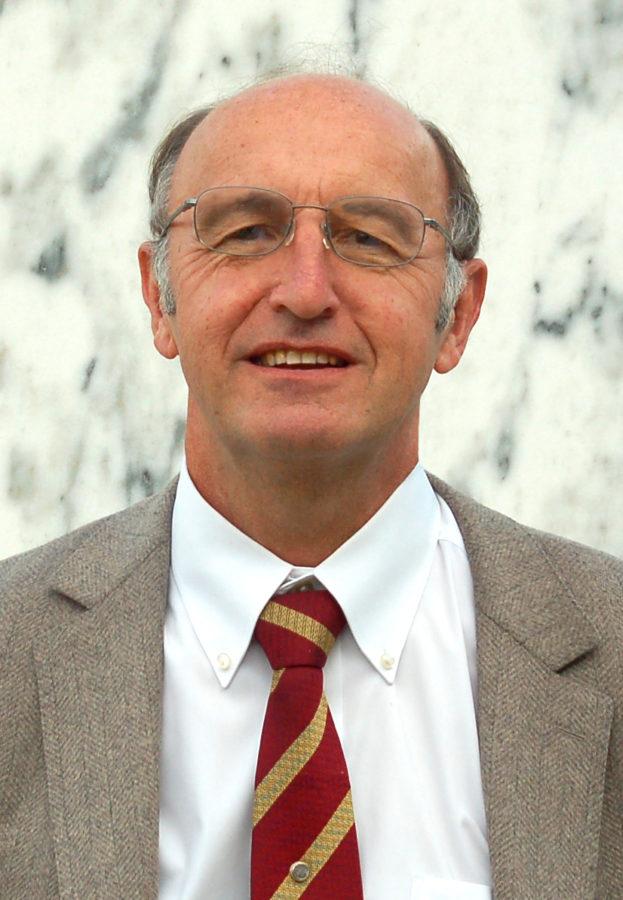Finalists announced for department chair’s replacement
Courtesy of Iowa State University
David C. Jiles has been selected as a Jefferson Science Fellow as a scientific adviser to the Department of State.
April 8, 2016
David Jiles, distinguished professor and chair of electrical and computer engineering, will be stepping down from his position after accepting a position in Washington, D.C., and the finalists to replace him are set.
Work has been done to fill the position since the beginning of the spring semester. After many weeks, the search committee has named its four finalists.
The committee is looking for a suitable person who has strong leadership skills, a strong vision for the electrical and computer engineering department, ability to do research and a positive stance on diversity and inclusion, said Steven Mickelson, professor of agricultural and biosystems and member of the search committee.
While two of the four finalists have already visited campus, the other two will have open forums for students and faculty to sit in and ask questions.
———
Min Song, department chair and professor of computer science and professor of electrical and computer engineering at Michigan Technological University
- Visited March 24 and 25
Song is the founding director of the Institute of Computing and Cybersystems at Michigan Technological University. He is the Dave House Professor and department chair of computer science as well as a professor of electrical and computer engineering. He serves as a communications society director of conference operations for the institute of electrical and electronics engineers.
Song, as a National Science Foundation (NSF) program director, has managed 11 programs and initiated three new programs in the field of wireless communications networks.
His career spans more than 26 years in the industry, academics and the government. His research interests are design, analysis and the evaluation on wireless communication networks, network security, cyber physical systems and mobile computing.
He has received more that $3.4 million in research funding from the Department of Energy, NSF, NASA and other private foundations. Song has also published more than 160 technical papers.
———
Aylin Yener, professor of electrical engineering at Penn State University.
- Visited Monday and Tuesday
Yener has been an electrical engineering professor since 2010 after being a visiting associate professor at Stanford University. Her research interests include information theory, communication theory, network science, green communications, information security and networked systems.
Yener is currently an elected member of the board of governors of the IEEE Information Theory Society for the 2015-2017 term. She also served as their treasurer from 2012-2014 and the student committee chair from 2007-2011.
She was the co-founder of the Annual North American School of Information Theory. She also served as an editor for several IEEE publications. She is currently an editor for the IEEE Transactions on Mobile Computing as well as a senior editor for the IEEE Journal on Selected Areas in Communications.
———
Marilyn Wolf, professor in the School of Electrical and Computer Engineering at Georgia Institute of Technology and Rhesa “Ray” S. Farmer distinguished chair of embedded computer systems.
- Will visit Monday and Tuesday and present at 10:30 a.m. Monday at 3043 CprE Addition.
Wolf earned her bachelor’s, master’s and Ph.D. in electrical engineering from Stanford University in the 1980s. She was a faculty member of Princeton University from 1989 to 2007.
Her research interests include cyber-physical systems, embedded computing, embedded video and computer vision and very large-scale integration systems.
She is a fellow of the IEEE and Association for Computing Machinery and an IEEE Computer Society Golden Core member.
———
Ashfaq Khokhar, professor and chair of the electrical and computer engineering department at the Illinois Institute of Technology.
- Will Visit April 28 and 29 and present at 3043 CprE Addition. Date and time are to be determined.
Khokhar received his bachelor’s in electrical engineering from the University of Engineering and Technology, Lahore, Pakistan, his master’s in computer engineering from Syracuse University and his Ph.D. in computer engineering from the University of Southern California.
His research includes context-aware wireless networks, computational biology, health care data mining, content-based multimedia modeling, retrieval and multimedia communication and high-performance algorithms.
He has contributed to five edited volumes and co-authored nine book chapters, 53 publications in archival journals and 158 refereed conference papers. His research has been supported by the National Science Foundation and National Institutes of Health.
In 2009, he was elected as an IEEE fellow for his work on multimedia computing and databases. He is also a member of the Phi Kappa Phi honor society.
———
Wolf and Khokhar are the next two candidates who will visit Iowa State. Both said they are looking forward to visiting campus to learn about Iowa State and its traditions.
“I’m looking forward to my visit,” Wolf said. “With cherry pies being traditional [because of Veishea], I’m hoping to snag one of those for my food blog.”
And while traditions are fun, they are also looking toward the future success of the electrical and computer engineering departments.
“The [electrical and computer engineering] department is in the trajectory of becoming one of the top schools in the nation,” Khokhar said “It should not be difficult to see the department in the top 20 within four to five years.”
A decision should be made sometime in May after the search committee sends the dean of the College of Engineering the strengths and weaknesses of each finalist.
















